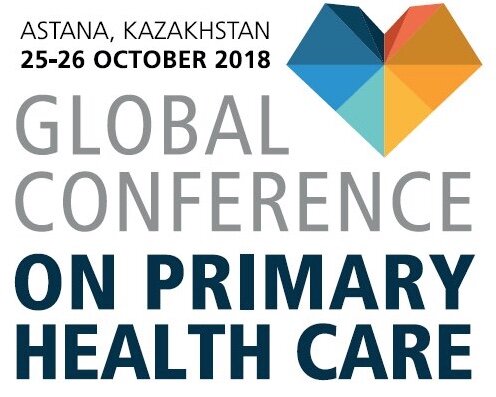Themes and Topics
Theme and Topics
The 3-day conference program will include sessions addressing various cross-cutting topics, using the commitments made in the 2018 Astana conference as a launchpad for discussion. Given the constantly evolving global landscape and the countless challenges the world has faced in just the past five years, this conference will serve as a platform for collaboration as we assess what progress has been made and what steps we have yet to take.

Be part of shaping the Primary Health Care Movement.
Join us at the International Conference for Primary Health Care to learn from and collaborate with other PHC leaders, thinkers, and decision-makers as we commit to building a
Resilient Primary Health Care: the Foundation of Universal Health Coverage in the Era of Sustainable Development Goals
Resilient Primary Health Care: the Foundation of Universal Health Coverage in the Era of Sustainable Development Goals
Five years after Astana, where are we with the recommendations to ...
CHOOSE
BUILD
EMPOWER
ALIGN
Make Bold Political CHOICES for Health across all sectors

A whole-of-government approach to health based on bold political decisions for health in all sectors, both nationally and globally is critical to ensuring that the rights of all people to receive and enjoy a high standard of health is met. The conference will explore exemplary leadership and governance in PHC to identify ways to effectively and strategically include a wide array of actors including planners, proviers, donors, users and communities in order to create a sturdy PHC system with effective stewardship and accountability at multiple levels. We hope to engage discussion including but not limited to the relative empowerment of MoHs vis-a-vis the role of donors in the political dimensions of health sector reform, and the challenges of PHC implementation in conflict-affected regions.
.
build sustainable Primary health care
As the global landscape continues to evolve, systems of primary health care must develop in a sustainable way. Recent years have seen this result in novel e-health and technological advancements. Digital technologies have become essential resources in building a primary health care that is sustainable and providing services that are of high quality and safety. While technology can be helpful to enhance healthcare, some may argue that if not utilized properly, it can also be a costly distraction. During the conference we hope to hear from a vast array of experiences and perspectives on how to efficiently and effectively incorporate e-health into existing healthcare services in a way that strengthens capacity and doesn’t compromise the delivery chain. We will take a closer look at exemplars of countries’ e-health integrations that support, and not substitute, the fundamental principles of quality, safety, and efficient service delivery, the very foundation of good healthcare. We will also discuss the best practices of ensuring data security and preserving patient’s rights when introducing innovative technological approaches in order to realize the benefits and avoid harms.

EMPOWER individuals AND COMMUNITIES

The strength of primary health care is rooted in an empowered people and workforce. The rights and protections of primary health care (PHC) workers play a crucial role in guaranteeing quality healthcare services. Equality and gender concerns are important to consider for the PHC workforce and there is a need for more involvement from young people in the sector. As community health workers remain the backbone of the delivery of primary healthcare, how do we ensure effective methods of recruitment, training, and retention that meet the needs of the workforce?
Efforts must also include the engagement of the community to ensure effectiveness and relevance. In addition to being cost-effective, communities should have agency over their own health and wellbeing, to invest in, participate in governance, and be heard. What are areas of the community that have been neglected and ought to be addressed? What are active and practical ways that the community can be wholistically and effectively involved in primary health care?
ALIGN STAKEHOLDER'S SUPPORT WITH NATIONAL POLICIES, STRATEGIES AND PLANS
PHC financing faces several challenges, including a low level of public funding, fragmented financing mechanisms, limited coverage for patients, and a lack of financial incentives for PHC providers to deliver priority services to patients. The establishment of a robust primary health care financing system is dependent upon the multi-sectoral collaboration of various stakeholders including donors, political actors, and the community.
It is important also to consider the role and responsibilities that each party may have. For example, to what extent do donors collaborate to support national leadership? How might widely different stakeholders interact and contribute meaningfully to improve Primary Health care?
ICPHC aims to explore ways these stakeholders’ support can be effectively aligned with national policies, strategies and plans in order to improve health outcomes. We hope country representatives use this platform to share their experience and lessons that can be adapted and used by other countries to guide implementation of effective PHC financing.
